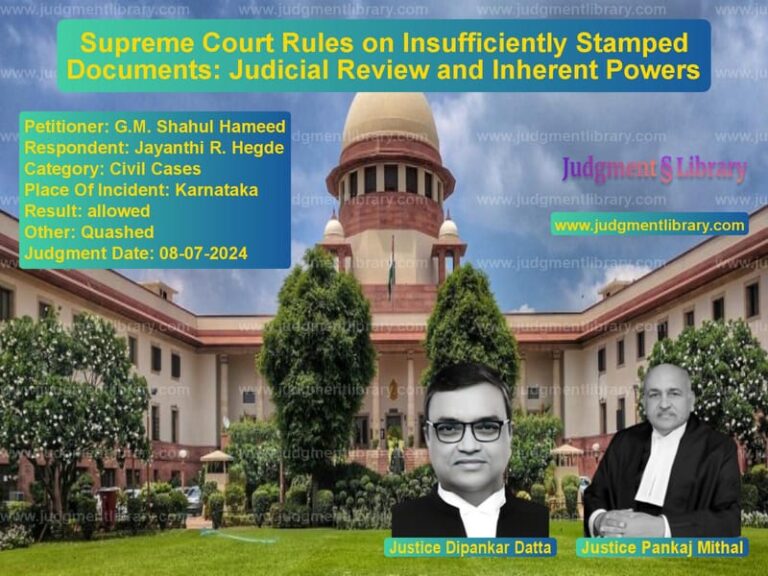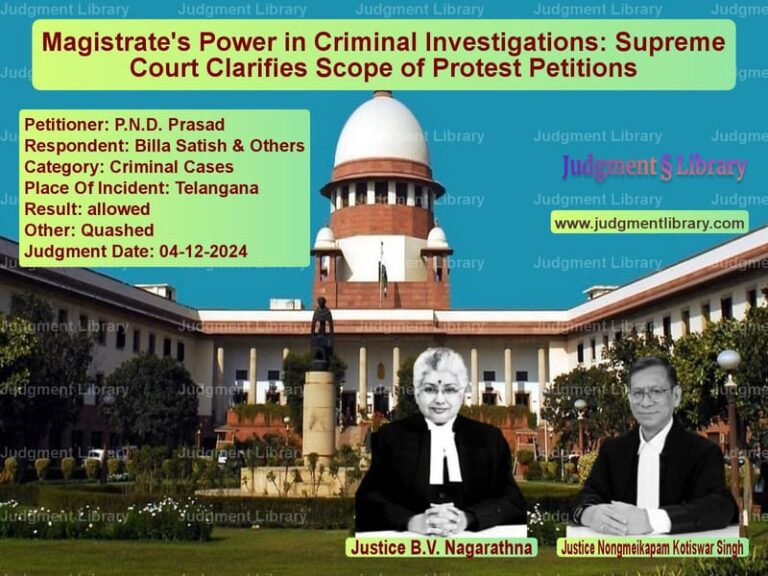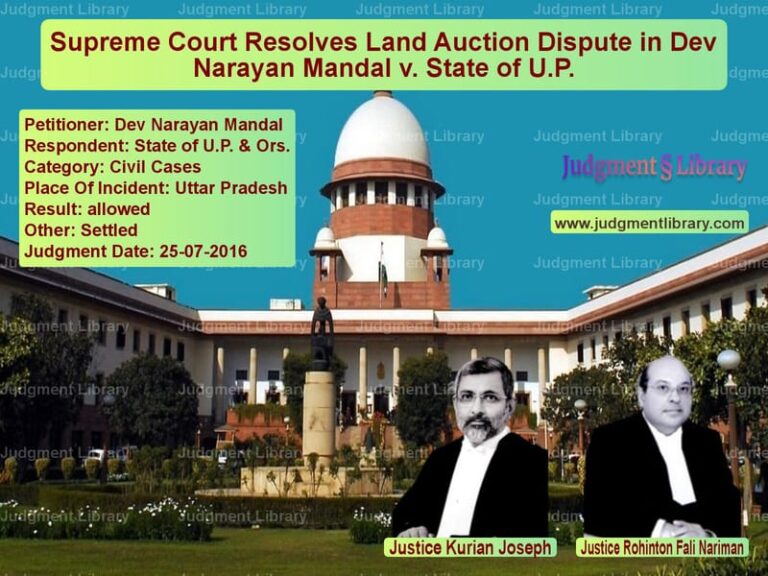Supreme Court Directs Police Commissioner to Review Candidature Cancellation in Recruitment Case
The Supreme Court of India recently ruled on the case of Vikram Singh vs. The Commissioner of Police, addressing the issue of cancellation of candidature in police recruitment due to alleged suppression of criminal history. The case highlights the importance of truthful disclosure in government job applications and how courts assess such cases.
Background of the Case
The case arose when the appellant, Vikram Singh, applied for a position as a constable. During the selection process, it was discovered that he had been involved in certain criminal cases. Although he had been acquitted before applying, the selection authorities found that he had failed to disclose this information in his application form. Consequently, his candidature was canceled on the grounds of suppression of material facts.
Aggrieved by this decision, the appellant challenged the cancellation before the High Court. However, the High Court dismissed his plea, upholding the cancellation. He then appealed to the Supreme Court, arguing that his past acquittals should not be held against him.
Arguments of the Petitioner (Vikram Singh)
- The appellant contended that he had already been acquitted of all charges before submitting his application.
- He argued that since there was no conviction, he was under no obligation to disclose his past cases.
- He further submitted that the cancellation of his candidature was an excessive punishment and that he should be given a fair chance.
Arguments of the Respondents (Commissioner of Police)
- The respondents maintained that candidates were required to truthfully disclose any past criminal proceedings, even if they were acquitted.
- They cited Avtar Singh v. Union of India & Ors., a landmark case that established guidelines on the impact of past criminal cases on government employment.
- They argued that suppression of facts, even if unintentional, affected the integrity of the selection process and justified the cancellation.
Supreme Court’s Observations and Judgment
The Supreme Court examined the matter in light of its ruling in Avtar Singh v. Union of India & Others, reported in (2016) 8 SCC 471, which provided detailed guidelines on dealing with candidates who had prior criminal cases.
1. Importance of Truthful Disclosure
The Supreme Court emphasized the necessity for candidates to provide accurate information about their past, stating:
“Information given to the employer by a candidate as to conviction, acquittal or arrest, or pendency of a criminal case, whether before or after entering into service, must be true and there should be no suppression or false mention of required information.”
2. Factors in Considering Candidature Cancellation
The Court referred to the Avtar Singh case to outline factors that employers must consider before canceling a candidate’s selection:
- If a candidate conceals a past conviction, their candidature may be canceled.
- If the candidate was involved in a case of trivial nature (such as minor protests) and the employer finds no moral turpitude, the suppression may be ignored.
- If a candidate was acquitted on technical grounds and not a clean acquittal, the employer may still reject the candidature.
- Employers must assess whether multiple pending cases exist, which could indicate a pattern of misconduct.
3. Employer’s Discretion in Decision-Making
The Court acknowledged that while a candidate may have been acquitted, the employer still retains the right to assess the circumstances surrounding the case:
“In a case where the employee has made a truthful declaration of a concluded criminal case, the employer still has the right to consider antecedents and cannot be compelled to appoint the candidate.”
4. Court’s Decision: Case to Be Reviewed
The Supreme Court, rather than making a final ruling on whether Vikram Singh’s candidature should be reinstated, directed the Commissioner of Police to re-evaluate the matter:
“The appellant is permitted to file a detailed representation before the respondent, within a period of one month from today. In the event of filing of such a representation, the respondent will consider the same in the light of the judgment referred to above and pass a reasoned order after affording an opportunity of hearing to the appellant, within a period of four months thereafter.”
5. High Court’s Decision Not Binding
The Supreme Court clarified that its order superseded the High Court’s ruling, allowing the Commissioner of Police to exercise independent judgment:
“We make it clear that the judgment of the High Court shall not stand in the way of the respondent/Commissioner of Police passing orders, as above.”
Conclusion
The Supreme Court’s ruling underscores the need for fairness and procedural justice in recruitment decisions. While truthfulness in disclosure is crucial, the judgment also ensures that candidates receive a fair chance to explain their past circumstances.
By directing the Commissioner of Police to review Vikram Singh’s case and make a reasoned decision, the Supreme Court has ensured that the cancellation of candidature is not arbitrary but based on a balanced assessment of facts.
Don’t miss out on the full details! Download the complete judgment in PDF format below and gain valuable insights instantly!
Download Judgment: Vikram Singh vs The Commissioner of Supreme Court of India Judgment Dated 15-11-2017.pdf
Direct Downlaod Judgment: Direct downlaod this Judgment
See all petitions in Recruitment Policies
See all petitions in Public Sector Employees
See all petitions in Employment Disputes
See all petitions in Judgment by Kurian Joseph
See all petitions in Judgment by R. Banumathi
See all petitions in Remanded
See all petitions in Remanded
See all petitions in supreme court of India judgments November 2017
See all petitions in 2017 judgments
See all posts in Service Matters Category
See all allowed petitions in Service Matters Category
See all Dismissed petitions in Service Matters Category
See all partially allowed petitions in Service Matters Category







